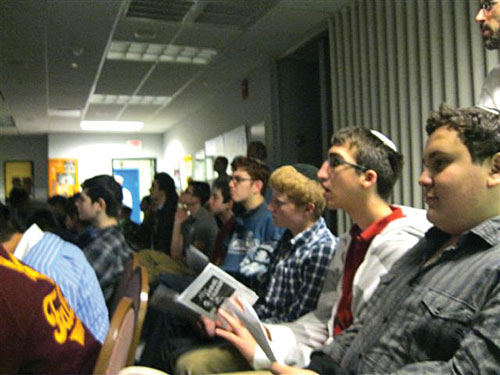.jpg) TABC Remembers in a Unique Way
TABC Remembers in a Unique Way
Anyone walking by the Beit Knesset at the Torah Academy of Bergen County (TABC) on April 8th might naturally have wondered what was capturing the attention of a large audience of teenaged boys. In fact, the yeshiva’s day-long Yom HaShoah commemoration was culminating in a dramatic presentation by the multi-talented actress and writer Carol Lempert, who was starring in her one woman play, After Anne Frank.
From the moment Lempert enters the room blowing the Tekiah on a giant shofar, the audience becomes immersed in this actress’ lively performance and in her life story as well. Lempert changes roles and voices frequently as she moves around the stage, weaving stories about her performances as Anne, Anne’s mother Edith and sister Margot in the three different versions of the play, Anne Frank. The actress also credits her acting career for her developing interest in examining her own family’s experiences during the Holocaust and tells the audience how she subsequently becomes more knowledgeable about her history and religion.
Ms. Lempert has performed in many different locations over the years, both large and small, but this is the first time she has ever attempted to visit a yeshiva high school. When she was invited to perform for the boys by history department chairman Cary Reichardt, she readily accepted the challenge, easily adapting to the school setting. As she admitted with a smile, “I am never afraid of trying new things. If people want to learn, I’m willing to be there.”
Given the short attention span of many of today’s teens, live theater in an intimate venue can present a challenge. Yet, in this “story about a story about a girl who sat at a desk,” the boys were increasingly drawn in as the play progressed. Ms. Lempert was in constant motion and her frequent injections of humor as she assumed 12 different roles, all served to have her audience follow her every move.
The play details Lempert’s life as a Jew who has no idea how to talk to G-d and is not even allowed to have a bat mitzvah. We learn that it is only when she is a young actress doing research for a play that she discovers a video made by her Uncle Ben. As she views it and learns of Ben’s horrific past in the Holocaust, she feels increasingly guilty to be alive.
Lempert worries if her acting performances in Anne Frank and other Jewish-themed plays commercialize the memory of the Holocaust. It is not until an elderly survivor in Ms. Lempert’s adult bat mitzvah class counsels that “telling her story is a Jewish thing, “that the actress becomes convinced that she is indeed committed to speak and to continue the “ripples that began after Anne Frank spoke.”
At home, the playwright’s Uncle Ben refuses to talk about his experiences in the war. He has only consented to secretly be interviewed for a video for the Holocaust archives at the public library to thwart the increasing number of Holocaust deniers; but he will never talk to his own family about the past. The boys look shocked when they hear that Uncle Ben uses the numbers tattooed on his arm as the combination for his garage door opener and they nod with recognition as he explains that he chose to become a traveling salesman so that he would never be in one place for a long time and therefore could never again be found. Throughout the play he tells his inquisitive young niece to “be nice…and stop asking so many questions.” In fact, the biggest laugh of the afternoon comes when a young Miss Lempert asks her uncle why there are only sons in the Haggadah. His reply and advice to her…. “A wise daughter would know when to be quiet.”
We the audience are indeed fortunate that Ms.Lempert decided not to remain quiet. Her craft is impacted by the Holocaust as she teaches audiences that we have to thank G-d daily for being alive. She is determined to reach out to as many people as she can to convey this message, even the tourist who approaches her at the Anne Frank House in Holland and upon confirming that Lempert is a Jew, says in wonder, “You see, they didn’t kill all of them.”
Carol Lempert’s uncle, after refusing to see her performance in Anne Frank, urges her to stop dwelling on the past. “Tell instead something delicious,” he urges.
We are indeed fortunate that the actress has chosen to do both, in her delicious and historically relevant performance.
By Estelle Glass











